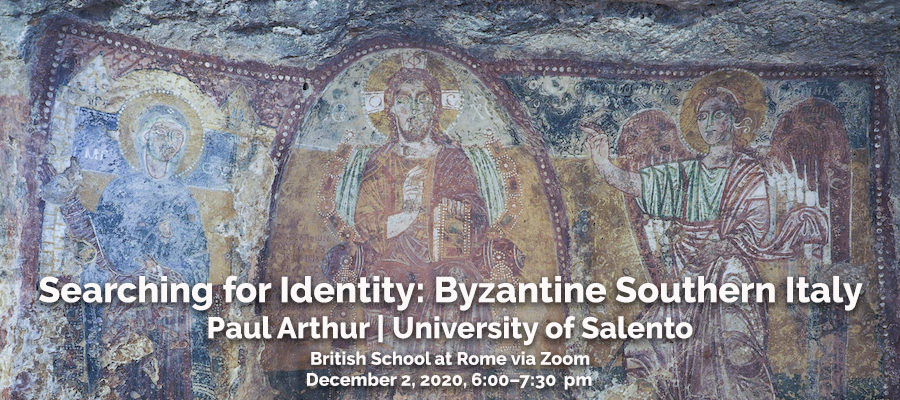Searching for Identity: Byzantine Southern Italy, lecture by Paul Arthur (University of Salento), British School at Rome via Zoom, December 2, 2020, 6:00–7:30 pm
There is abundant literature on the Byzantine reconquest of Italy in the 6th century and on the transition from late antiquity to the Middle Ages. Paradoxically, despite various historical contributions on the long period of Byzantine domination in the South, from the 6th to the 11th century, there is a lack of archaeological studies that propose an integrated overview. This is unfortunate, as the centuries were formative in the definition of southern Italy, helping to make it what it is today. This can be seen in many aspects of the country, including settlement patterns and communication, food and language, culture and traditions and, apparently, genetic makeup and mentality.
With these problems in mind, I applied for a major funding to the Italian Ministry of Education, which was awarded for the project entitled “Byzantine Heritage of Southern Italy: settlement, economy and resilience in changing territorial landscape contexts”. The aim of the project is therefore to provide a panorama of the Byzantine heritage and its role in the formation of society across southern Italy, proposing to make different sources (archaeological, documentary, climatic and environmental, anthropological, genetic) interact in a systemic way through a database linked to a GIS platform. Even if we may speak of this large territory as a political significant entity in Byzantine times, it was constantly changing in size and boundaries, and in social composition through politics and mobility. Thus, it was also somewhat of a palimpsest. The examination of the ‘Byzantine Heritage of Southern Italy’ is thus an examination of differences and contrasts, in which we will explore and characterize unity in disunity.
The ultimate aim of the project is thus to rewrite part of the history of Italy from a new point of view, enhancing the vision of the South in its role as a geographical centre of the Mediterranean and key territory to the survival of the Byzantine Empire through a global analysis of interconnecting data.
Furthermore, the project intends to play an active role in the communication and dissemination of research results to the general public in line with modern trends of ‘public archaeology’. Therefore, the processing of information, in addition to normal scientific outlets, involves public presentation and the involvement of schools, in order for it to play an active role in disseminating knowledge so as to impact on local understanding and international tourism, thus reinforcing unity and identity.
Paul Arthur holds the Chair of Medieval Archaeology at University of Lecce (now Salento).
